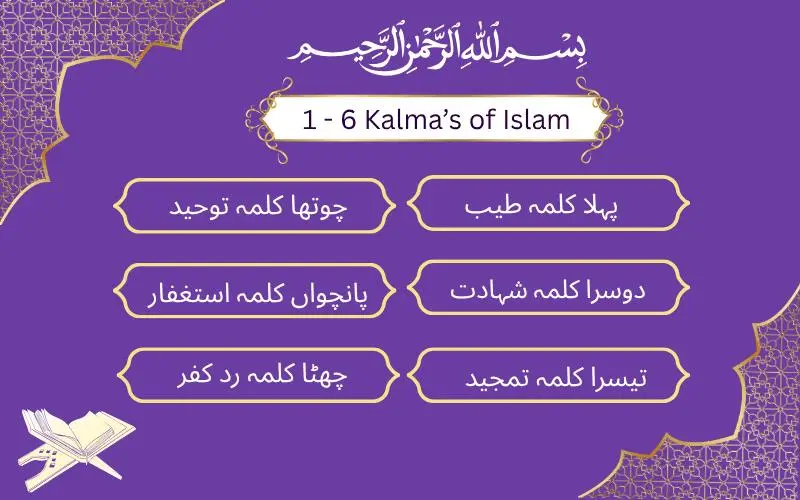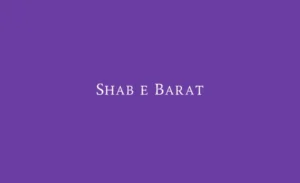The Six Kalmas (Kalimat) in Islam are concise yet powerful declarations that reflect the core tenets of Islamic belief. Memorized and recited by Muslims from an early age, these phrases serve as foundational reminders of faith (Īmān), the Oneness of Allah (Tawḥīd), and the importance of repentance, gratitude, and submission to the divine will.
While not all six Kalmas are directly found in one place in the Qur’an or Sunnah, their meanings are deeply rooted in authentic Quranic teachings and supported by Qur’anic verses and prophetic traditions. Each Kalma carries its own unique spiritual weight, offering Muslims a daily opportunity to reaffirm their beliefs, seek forgiveness, and strengthen their connection with Allah (الله). Whether you are a lifelong Muslim or newly exploring the faith, understanding these six Kalmas provides a meaningful window into the heart of Islam.
What Are the Six Kalmas?
In Islam, the Six Kalmas (Kalimāt – كلمـات) are fundamental declarations of faith that summarize the core beliefs and principles of a Muslim’s spiritual journey. These short, powerful phrases are often memorized and recited by Muslims worldwide as a means to affirm their faith (īmān – إيمان), seek forgiveness, and maintain spiritual awareness.
The word Kalma (كلمة) means “word” or “phrase” in Arabic. The Six Kalmas collectively cover essential themes such as Tawḥīd (توحيد) – the Oneness of Allah, repentance, and prayer for guidance.
Why Are the Six Kalmas Important?
The Six Kalmas are important because they summarize the essential beliefs of Islam in simple, memorable phrases. They help Muslims internalize key concepts such as the Oneness of Allah (Tawḥīd), the finality of the Prophet Muhammad ﷺ, and the need for repentance and glorification of Allah. Reciting them regularly reinforces faith, promotes spiritual discipline, and strengthens a believer’s connection with their Creator. Below are their importance:
- Foundation of Faith: The Kalmas encapsulate key Islamic beliefs and are often the first lessons taught to children and new Muslims.
- Spiritual Protection: Reciting the Kalmas is believed to offer spiritual protection and increase closeness to Allah (الله).
- Path to Purity: They encourage self-purification through repentance and submission to Allah’s will.
- Common Ground: These phrases unite Muslims of all cultures and languages under one shared expression of faith.
Overview of the 1 to 6 Kalma with Arabic, Transliteration, and Meaning
The Six Kalmas offer a structured overview of core Islamic beliefs through short, powerful declarations. Each Kalma is presented in Arabic, along with its transliteration and English meaning, making it accessible for learners and non-Arabic speakers. From affirming the Oneness of Allah to seeking forgiveness and rejecting disbelief, these Kalmas serve as essential spiritual tools that guide a Muslim’s faith and daily worship.
Below are each kalma with their Arabic, English, and transliteration.
1. Kalma Tayyibah (The Word of Purity)
Arabic:
لَا إِلٰهَ إِلَّا اللّٰهُ مُحَمَّدٌ رَسُولُ اللّٰهِ
Transliteration: Lā ilāha illā-llāh, Muḥammadun Rasūlu-llāh
Meaning: There is no god but Allah, and Muhammad is the Messenger of Allah.
This Kalma is the declaration of absolute monotheism (Tawḥīd) and the prophethood of Muhammad ﷺ. It is the foundation of Islamic faith and the key to entering Islam, declaring the absolute Oneness of Allah (Tawḥīd) and the finality of the Prophet Muhammad ﷺ as His Messenger. It is the gateway to entering Islam and the most powerful statement a believer can make. This Kalma purifies the heart, affirms true belief, and is considered the key to Paradise when uttered with sincerity and conviction.
2. Kalma Shahadah (The Word of Testimony)
Arabic:
أَشْهَدُ أَنْ لَا إِلٰهَ إِلَّا اللّٰهُ وَحْدَهُ لَا شَرِيكَ لَهُ وَأَشْهَدُ أَنَّ مُحَمَّدًا عَبْدُهُ وَرَسُولُهُ
Transliteration: Ashhadu an lā ilāha illā-llāh waḥdahu lā sharīka lahu, wa ashhadu anna Muḥammadan ʿabduhu wa rasūluhu
Meaning: I bear witness that there is no god but Allah, He is One and has no partner, and I bear witness that Muhammad is His servant and Messenger.
This Kalma emphasizes Allah’s oneness and rejects all forms of polytheism or association with Him. It is a formal declaration of a Muslim’s faith and identity. It affirms the Oneness of Allah and the prophethood of Muhammad ﷺ, serving as the first pillar of Islam. Reciting this testimony with belief marks one’s entrance into Islam, while living by it strengthens one’s connection to Allah and upholds the essence of Islamic monotheism (Tawḥīd) and submission.
3. Kalma Tamjeed (The Word of Glorification)
Arabic:
سُبْحَانَ اللّٰهِ وَالْحَمْدُ لِلّٰهِ وَلَا إِلٰهَ إِلَّا اللّٰهُ وَاللّٰهُ أَكْبَرُ وَلَا حَوْلَ وَلَا قُوَّةَ إِلَّا بِاللّٰهِ الْعَلِيِّ الْعَظِيمِ
Transliteration: Subḥānallāh wal-ḥamdu lillāh wa lā ilāha illā-llāh wallāhu akbar wa lā ḥawla wa lā quwwata illā billāhil-ʿaliyyil-ʿaẓīm
Meaning: Glory be to Allah, and all praise is due to Allah, and there is no god but Allah, and Allah is the Greatest. There is no power and no strength except with Allah, the Most High, the Most Great.
This Kalma glorifies Allah and reminds believers of His supreme power. It is a profound expression of praise, gratitude, and recognition of Allah’s greatness. It glorifies Allah’s perfection (Subḥānallāh), expresses thankfulness (Al-ḥamdu lillāh), affirms monotheism (Lā ilāha illā-llāh), and acknowledges His supreme power (Allāhu Akbar). This Kalma nurtures humility and constant remembrance (dhikr) in a believer’s heart, strengthening the spiritual bond with the Creator.
4. Kalma Tawheed (The Word of Unity)
Arabic:
لَا إِلٰهَ إِلَّا اللّٰهُ وَحْدَهُ لَا شَرِيكَ لَهُ لَهُ الْمُلْكُ وَلَهُ الْحَمْدُ وَهُوَ عَلَىٰ كُلِّ شَيْءٍ قَدِيرٌ
Transliteration: Lā ilāha illā-llāh waḥdahu lā sharīka lahu, lahul-mulku wa lahul-ḥamdu wa huwa ʿalā kulli shay’in qadīr
Meaning: There is no god but Allah, He is One and has no partner. His is the dominion and His is the praise, and He is over all things powerful.
This Kalma reaffirms Allah’s sole authority and omnipotence. It emphasizes the absolute Oneness of Allah and His exclusive right to be worshipped. It declares that Allah has no partners, that all dominion and praise belong to Him, and that He has power over everything. This Kalma strengthens Tawḥīd in a believer’s heart, protecting against shirk (associating partners with Allah) and reminding one to place complete trust in Allah’s authority and will.
5. Kalma Astaghfar (The Word of Seeking Forgiveness)
Arabic:
أَسْتَغْفِرُ اللّٰهَ رَبِّي مِنْ كُلِّ ذَنْبٍ وَأَتُوبُ إِلَيْهِ
Transliteration: Astagfirullāh rabbī min kulli dhanbin wa atūbu ilayh
Meaning: I seek forgiveness from Allah, my Lord, for all my sins, and I repent to Him.
This Kalma expresses sincere repentance and the desire for Allah’s mercy. It is a powerful expression of humility and repentance. It reflects a believer’s acknowledgment of their sins and their sincere intention to seek Allah’s mercy and forgiveness. Regularly reciting this Kalma softens the heart, purifies the soul, and draws one closer to Allah, as He loves those who repent (at-Tawwābīn). It is a vital step toward spiritual renewal and moral accountability in Islam.
6. Kalma Radd-e-Kufr (The Word of Rejecting Disbelief)
Arabic:
اللّٰهُمَّ إِنِّي أَعُوذُ بِكَ مِنْ أَنْ أُشْرِكَ بِكَ شَيْئًا وَأَنَا أَعْلَمُ وَأَسْتَغْفِرُكَ لِمَا لَا أَعْلَمُ إِنَّكَ أَنْتَ عَلَّامُ الْغُيُوبِ
Transliteration: Allāhumma innī aʿūdhu bika min an ushrika bika shay’an wa anā aʿlamu wa astaghfiruka limā lā aʿlamu, innaka anta ʿallāmul-ghuyūb
Meaning: O Allah, I seek refuge in You from associating anything with You knowingly, and I seek Your forgiveness for what I do not know. Indeed, You are the Knower of the unseen.
This Kalma is a firm rejection of polytheism and shirk (associating partners with Allah). It is a heartfelt plea seeking protection from shirk (associating partners with Allah), whether done knowingly or unknowingly. It reinforces a believer’s commitment to pure Tawḥīd and safeguards their faith from the subtle influences of disbelief (kufr). This Kalma is especially important for renewing one’s faith and ensuring that their belief remains free of hidden or unintentional forms of polytheism.
How to Use the Six Kalmas in Daily Life?
The Six Kalmas can be incorporated into daily life through regular recitation, reflection, and teaching them to children as part of early Islamic education. They serve as powerful reminders of faith, repentance, and devotion, helping to keep the heart connected to Allah throughout the day.
- Memorization and Recitation: Many Muslims memorize and recite the Kalmas during daily prayers or before sleeping as a form of dhikr (remembrance).
- Teaching Children: The Kalmas are commonly taught to children as foundational lessons in Islam.
- Spiritual Reflection: Reciting the Kalmas helps reinforce core Islamic beliefs and encourages self-purification.
- Repentance and Renewal: Particularly Kalma Astaghfar and Radd-e-Kufr are used to seek forgiveness and reaffirm faith.
The Spiritual Significance of the 1 to 6 Kalma
The Six Kalmas serve as a spiritual toolkit for Muslims, distilling essential Islamic teachings into succinct, powerful phrases. Whether it is proclaiming the oneness of Allah, seeking forgiveness, or affirming belief in the Prophet Muhammad ﷺ, these kalmas foster deep faith, spiritual mindfulness, and ethical living.
Their widespread use across cultures and generations highlights their importance in nurturing a Muslim’s connection with Allah and their understanding of Islam’s core principles.







4 Responses
I just could not depart your web site prior to suggesting that I really loved reading your posts!
Hi there, for all time i used to check web site posts here in the early hours in the daylight,
for the reason that i love to learn more and more.
Keep this going please, great job!
Hey very nice blog!